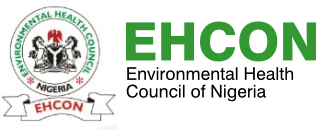Background of EHCON

Environmental health remained unregulated in Nigeria over the years until 2002, when the democratic government then decided to grant it professional recognition through the enactment of the Environmental Health Officers (Registration, etc) Act 11 of 2002 (As Amended). The Act established the Council charged with the responsibility of regulating Environmental Health profession in Nigeria.
The specific objectives of the Council include:
- determining what standards of knowledge and skill are to be attained by persons seeking to become members of the profession of Environmental Health and improving those standards from time to time as circumstances may permit;
- securing in accordance with the provisions of the Act the establishment and maintenance of a register of persons registered under the Act as members of the profession and the publication from time to time of lists of those persons;
- conducting examinations in the profession and awarding certificates or diplomas to successful candidates as appropriate and for such purpose, the Council shall prescribe fees to be paid in respect thereof, and
- performing the other functions conferred on the council by the act.
The first Council of eleven members was inaugurated in March 2004 by Col. Bala Mande (rtd), the then Hon. Minister of Environment, on behalf of the President of the Federal Republic of Nigeria. Since then, the members have dedicated themselves to the cause with great determination, in the face of daunting challenges to carry out the mandate of the Council. To this end, the Council opened register in July 2004, in which members have been registering. It has developed various curricula for the training of its members and has also been conducting examinations for new entrants into the profession. The Council is reaching out to other professional bodies and stakeholders for the proper regulation of the field and is determined to continue to explore every avenue to ensure that Nigerians live in an environment devoid of hazards and threats to their lives, which also increase disease burden, which is currently more than 70% environment related in the country.
Environmental Health Practice
Environmental health has been defined recently as comprising of those aspects of human health, including quality of life, which is determined by physical, biological, chemical, social and psychological factors in the environment. It also refers to the theory and practice of assessing, correcting, controlling, and preventing these factors that can potentially affect, adversely the health of present and future generations. Environmental health programmes are organized community efforts to monitor and modify man environment relationships in the interest of better health.
Environmental Health is a major branch of public health, which plays a significant role in disease prevention, control and the sustenance of environmental integrity. It has been defined as ‘the control of all factors in man’s physical environment which exercise, or may exercise, a deleterious effect on his physical development, health or survival’. Environmental Health therefore is a broad concept in public health, which is ‘the science and art of preventing disease, prolonging life and promoting health through organized efforts of the society.
The outcome of environmental health organization is the prevention, detection and control of environmental hazards which affect human health through the following functions as specified by World Health Organization:-
- waste management;
- food control and hygiene;
- pest and vector control;
- environmental health control of housing and sanitation;
- epidemiological investigation and control;
- air quality management;
- occupational health and safety;
- water resources management and sanitation;
- noise control;
- protection of recreational environment;
- radiation control and health;
- +control of frontiers, air and sea ports and border crossing;
- pollution control and abatement;
- educational activities (health promotion and education);
- promotion and enforcement of environmental health quality standards;
- collaborative efforts to study the effects of environmental hazards (research);
- environmental health impact assessment.(EHIA).
Environmental Health Practitioners
Environmental Health Officer (EHO) is one of the health professionals whose creation was based on need and exigencies rather than desire or sentiments. This was the case since 1831 in Britain when the first set of Sanitarians were put together to control the worst cholera outbreak in that country. The 1848 Public Health Act provided for the appointment of Inspector of Nuisance to tackle sanitary issues.
The Inspector of Nuisances as of then had no qualification, and their main job was to point out all breaches of sanitary regulations and enforce the byelaws and rules of the council and health committee. It is worthy of note that in the 1846 Liverpool Sanitary Act, the Inspector of Nuisance was defined as an officer of the council independent of the Medical Officer of Health, but by nature of his functions, cooperates closely with him. It should also be noted that as far back as 1860, Edmund Parkes, the first Professor of Hygiene developed Military Hygiene into a science before the Army Medical School became the Royal Sanitary Institute, and Inspectors of Nuisance have had their recognition not just as health professional but as key operators in the prevention of diseases.
In 1877, the Royal Sanitary Institute was introduced with specific training for Nuisance Inspectors. With the acquired skills and knowledge, their role changed with the change in title in 1956 to Public Health Officer, and again in 1974 to Environmental Health Officers. These changes mirrored increasing expertise, as inspector acquire more knowledge about pollution and other environmental hazards.
In Nigeria, the pattern and change in nomenclature followed that of Britain; from Sanitary Attendants in the 1915s to Sanitary Inspectors of 1930s, to Health Superintendents of 1970s, and to (EHOs) in 1988, which brought the nomenclature in line with the international recognized and accepted name for the practitioners. The EHOs came into existence in Nigeria as a distinct occupational group during the colonial era and they were known as Sanitary Inspectors. Their duties included sanitary inspection of premises, control of infectious disease such as yaws, small pox and other such diseases; disinfections and disinfestations, liaison with other professional groups on disease control efforts, prosecution of sanitary offender, verification of notices issued and enforcement of environmental health standards, laws and regulations.
Sanitary Inspectors were a force to reckon with in the colonial era in the area of preventive health services in Nigeria. This cadre of professionals forms the backbone of environmental health services worldwide. Their training is related to the environmental health aspect of a cross-section of development sectors, with emphasis on inter-sectorial liaison, community participation and health promotion.
EHOs today may be regarded as the general practitioners of public health since they are in daily contact with the source of ill health in the community, but their training, qualification and job evaluation put them at par with any other professional group with specific responsibility on environmental health control. This is enormous responsibility, which is capable of lifting the profession and the practitioners to the sky, can equally bring them to the mud. EHOs therefore must take the challenge and responsibility for failures in the health status of our communities as their role in disease prevention, health promotion and rehabilitation is a direct consequence (positive or negative) of how we fare. It is the failure of environmental health control programmes that determine what happen in the other spectrum of the health care delivery system, more so as over 70% of health problems on Nigeria are environment related.
EHOs are well placed to participate meaningfully in new approaches to environment and health management. Presently, there exist a scientific society, the Society for Environmental Health of Nigeria and an Environmental Health Officer’s Association of Nigeria, a professional group whose aim is to protect and promote the welfare of the professionals. The profession also has sub-professional groups that must work under the supervision of the EHOs. These cadres include:
- Environmental Health Technicians
- Environmental Health Assistants.
The challenges posed to mankind by inadequate management of environmental factors, emerging and re-emerging of infectious diseases in our communities, have necessitated the need to regulate the profession and strengthen the professionals.
To perform environmental health functions effectively, the EHO requires: (i) investigative skill; (ii) analytical skill; (iii) communicative skill; (iv) educative skill; (v) organizational skill and (vi) attitudinal skill.
EHO activities include:-
- Administration, inspection, education and regulation in respect of EH. EHO is a generalist across the range of basic EH activities.
- Surveillance over health related environmental conditions, including necessary monitoring activities, providing professional advice and guidance, thereby gaining community confidence and encouraging participation.
- Acts as a public arbiter of EH standard, maintain close contact with community. Must at all time be aware of the general environmental circumstances including new hazards to health in his area of jurisdiction and what resources are available to tackle them.
- Application of professional standard in his work in relation to non-professionals involved in EH, and relate professionally with other health professionals like physician, veterinarian, toxicologist, sanitary engineer, laboratory scientist, nurse etc.
- Maintenance of effective liaison with other professional officers who have a contribution in promoting EH e.g. water resource manager; waste manager; housing manager; rodent, pest, insect control officers; and recreational facility manager. EH is much a team concept, and this must be recognized in any organizational arrangement.
- Carry out the well-established duties of sanitarian, including inspection of housing and food hygiene, monitoring and control of new hazards due to intensive industrialization e.g. pollution by chemical, biological and physical agents; and preventive role in relation to environmental hazard to health.
- Understanding the principles and practical knowledge involved in personal health, animal health, microbiology, provision of water etc. This will enable him contribute to broad base decisions and to make the decisions alone. He must understand the environmental aspects of the problems, which are the concern of other professionals, and contribute to their solution.
- Plan and coordinate activities between different professional discipline, agencies, authorities, and maintain continuous link with these professionals e.g. physician, microbiologist, chemist, civil engineers, veterinarian, lawyers, technician and other ancillary personnel and artisans.
- Act independently in both advisory and enforcement capacities, exercising self-reliance and initiatives, functioning as a member of broader team with other professionals in implementing environmental health programme.
- Interpret legislation, promote and maintain standard and solve problems, which may come to light.
- Acquaint self with actual or potential environmental hazards and ensure that appropriate action is taken to deal with them – with the backing of strong legislation.
- Combine training in public health, toxicology and environmental sciences to enable him cope with such problems as soil pollution, chemical pollution, liquid radioactive wastes from industries, pollution of the home environment due to such products as cosmetics, detergents, paints, pesticides and gas fuel; heavy metal contaminant eg mercury, barium, cobalt and other metals, and new problems in food safety such as irradiation of food.
- EHO within the public service should perform the following basic functions:-
- improve and protect human health from environmental hazards,
- enforce environmental health legislation,
- develop liaison between the inhabitants and local authority, and between local authority and higher authority,
- act independently to provide advice on environmental health matters,
- initiate and implement advocacy and health promotion and education programmes to promote an understanding of environmental health principles.
- Operate in a managerial capacity, due to his range of functions, in collaboration with other environmental agencies and services.
